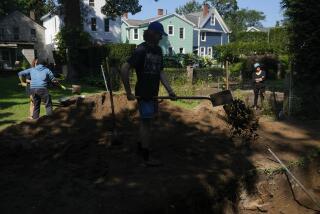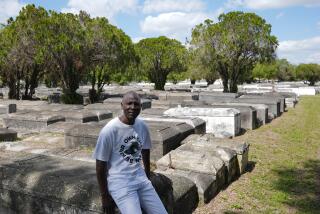Hometown split over John Brown’s legacy : Some in Torrington, Conn., want to mark the famed abolitionist’s birthplace. Others reject honoring a ‘scoundrel.’
TORRINGTON, Conn. — In a small patch of grass alongside a quiet country road, a graying stone marker stands as the only memorial here to a man who links the city to one of the stormiest periods in American history.
John Brown, the fierce anti-slavery crusader whose bloody raids in Kansas and Virginia helped plunge the nation into civil war, was born in a farmhouse at the site nearly 200 years ago.
But while his memory is preserved at several historic locations, including Harper’s Ferry, Va.--scene of his final, and most daring, raid--there is precious little to recall the famous abolitionist in his hometown, about 25 miles north of Hartford.
A sign on one of Torrington’s main entrance roads announces that the city is the “birthplace of John Brown.” And the city seal depicts the farmhouse where he lived from the time he was born in 1800 until 1805. But that house burned in 1917, and there is no historic site or museum that recalls who Brown was or what he did.
Some say the absence of more visible reminders reflects lingering ambivalence in the city about the controversial abolitionist.
While he is still revered by many here and elsewhere for his role in freeing the slaves, there are some in Torrington who cringe at being associated with one who took the law into his own hands, according to City Councilor Sue Cogswell.
“They don’t care for his methods,” Cogswell said of Brown, who was hanged in 1859 after leading a bloody takeover of a federal arsenal in Harper’s Ferry.
The mixed feelings were rekindled recently when Mayor Delia R. Donne proposed reviving a plan to rebuild the Brown house and make it into a museum.
The idea has drawn a cool response from the local John Brown Assn., a group that owns the 120-acre property where Brown’s birthplace was located but holds no apparent reverence for him.
“Why would anybody be interested? There’s nothing to admire in John Brown,” John Brooks, a local banker and association member, told the Litchfield County Times.
“I wouldn’t honor him. That guy got us into the Civil War. John Brown was born here, but that isn’t anything we should be proud of. That scoundrel . . . took the law into his own hands,” said the 95-year-old Brooks.
Such talk infuriates Brown supporters, who say that whatever his shortcomings, he played a key role in righting one of the nation’s greatest evils.
“John Brown freed the slaves,” Donne said. “That’s what the United States is all about. I think we should tell my children and grandchildren that he was a man that cared.”
“He’s one of America’s heroes. He was far from a saint. . . . But he took the bull by the horns,” city historian Ernest Ceder said.
Although he spent just five years in Torrington before moving to Ohio with his family, Brown retained roots to the town, returning to the area to go to school and later to go into business.
Fiercely religious, Brown gained fame in the 1850s when he led an anti-slavery military group that clashed with pro-slavery forces in Kansas. His raid on Harper’s Ferry was part of a plan to start a slave uprising in the South. Although he was captured and later hanged for treason, the raid helped set the stage for the Civil War.
The John Brown Assn. has met only twice in 10 years, and during that time the subject of rebuilding the Brown house hasn’t come up, said President Joseph E. Cravanzola, who notes the property is under long-term lease to the Torrington Water Co.
But according to local resident Edward H. Neidt, an original association purchased the land in 1901 with the aim of restoring the Brown house. He said the group went defunct in 1929 when the last member died. Neidt asserted that the current association, formed by another group of business people shortly thereafter, never owned the land and thus had no authority to lease it.
*
Cravanzola says there is “no question” in his mind that the property belongs to the association.
But it may not just be the association that needs convincing about the need to do more for John Brown. Other attempts to honor the abolitionist have been stymied in the past, including several years ago when the local school board rejected as too controversial a proposal to name a school after him.
But Donne said she will press on. “If we’re the hometown of John Brown, we should have a home of John Brown,” she said, “not an old tombstone that says he lived here.”
More to Read
Sign up for Essential California
The most important California stories and recommendations in your inbox every morning.
You may occasionally receive promotional content from the Los Angeles Times.










